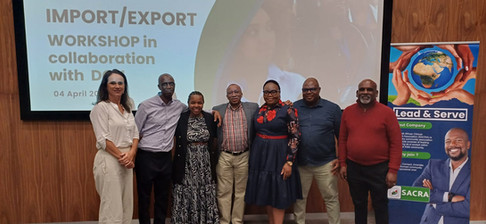Streamlining Permit Processing: A Path to Efficient Health Research in South Africa
- SACRA Admin

- Apr 9
- 2 min read
In the recent Department of Health Workshop held on 4 April 2025 hosted by SACRA and IPASA together with NDoH team, critical discussions unfolded surrounding the ongoing challenges and strategies in permit processing and backlog management. These discussions are vital as they directly impact the efficiency of health research and the regulation of importing and exporting laboratory samples, particularly in South Africa.
Dr. Relebohile Ncha, Chief Director: Hospitals and Tertiary Health Services, Quality Improvement, EMS, Trauma and Violence, FPS, and Implementation of Chapter 8 of NHA at the National Department of Health, highlighted the pressing issue of staff shortages and outdated manual systems that have hampered the ability to meet deadlines. To combat these difficulties, interventions such as staff overtime and external support were introduced, though these measures provided only temporary relief.
The meeting underscored the need for digitization as a long-term solution, prompting collaboration with the National Department of Health IT Department and consideration of external expertise. The introduction of interns, despite their initial lack of experience, has already shown promise in reducing backlogs, demonstrating that innovative staffing solutions can play a part in addressing these challenges.
Mr. Mpho Kgasi talked about the Pilot Phase 1 and Phase 2 projects that was aimed at streamlining processes and significantly reducing permit processing times. By replacing slow, manual methods with new templates and structured phases, the turnaround time for permit approvals has improved. He emphasized the importance of timely, high-quality submissions and effective communication with the broader industry. He expressed that in future it would be ideal to have updated templates and guidance accessible online to prevent delays and ensure smoother operations.
Beyond the logistical improvements, the meeting delved into the complex issues surrounding the regulation and logistics of importing and exporting laboratory samples for research purposes. Participants discussed the absence of clear regulations and the bureaucratic hurdles involved in acquiring import permits and managing the shipping process for human biological samples across international borders. The conversation emphasized the adherence to ethical guidelines, necessary approvals, and the responsible use of samples, while also highlighting the need for improved coordination among regulatory bodies, industry stakeholders, and ethics committees. A key point raised was the importance of submitting high-quality applications complete with all required documents—such as the Material Transfer Agreement (MTA), Ethics Approvals, and relevant Forms—to avoid unnecessary delays in the review process. Incomplete or poor-quality submissions lead to repeated back-and-forth communication, further postponing the issuance of permits and impacting research timelines.
Also highlighted was the challenges regarding the import processes for proficiency testing samples, which often do not require permits but face resistance due to a lack of understanding among officials. There is a strong call for clear guidelines and better communication to ensure that logistical and regulatory obstacles do not impede scientific progress. By aligning with global practices and continuing dialogue, the aim is to facilitate efficient research while upholding ethical and legal standards, ultimately supporting the advancement of health research in South Africa.
This workshop opened up the beginning of open communication and collaboration between industry stakeholders and the Department of Health for a better working relationship and dialogue for the future.













Comments